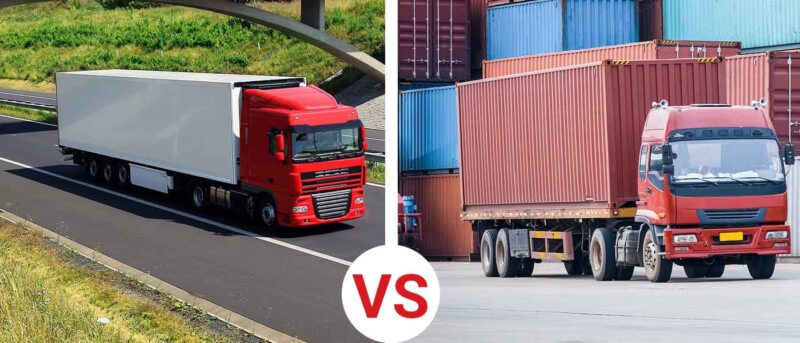At first glance, logistics and transportation might seem like interchangeable terms or just two words with the same meaning. However, the reality is quite different. There are significant difference between logistics and transportation, and understanding these distinctions is crucial for anyone involved in supply chain management. In this article, we’ll delve into the key difference between logistics and transportation, so if you’re eager to learn more, keep reading.
Understanding Logistics
To start, logistics is a term that encompasses the entire process of getting products from the production facility to the end customer. It’s not just about moving goods from one location to another; it’s akin to planning an intricate road trip for your products. This involves devising the best route, ensuring every step is optimized, and integrating advanced technologies to track and manage inventory effectively. Logistics is a comprehensive process that includes everything from managing the storage of goods to coordinating their movement and ensuring they arrive at their destination efficiently.
In essence, logistics is about orchestrating the entire supply chain process. It involves strategizing how goods are handled, stored, and transported. The role of logistics is to ensure that every aspect of the supply chain works seamlessly, minimizing delays and optimizing costs. This requires a holistic approach to planning and execution, considering factors like inventory management, warehousing, and distribution.
Exploring Transportation
Transportation, on the other hand, is a subset of logistics focused specifically on the movement of goods. It’s about selecting the appropriate mode of transport—whether by road, rail, air, or sea—and ensuring that products are delivered from one point to another. The primary concern here is the actual physical movement of goods and the logistics involved in this process.
Transportation deals with the day-to-day details of shipping items, such as scheduling shipments, packing goods properly, and finding the most efficient routes. It’s a critical component of the logistics chain but only one part of the overall process. Transportation is all about ensuring that goods are delivered safely, on time, and in the most cost-effective manner.
Key Difference Between Logistics and Transportation
Scope of Operations
The scope of logistics is broad and covers the entire supply chain process. It involves planning and managing everything from the point of origin to the final destination. Logistics is responsible for handling, storing, and distributing goods while ensuring that the entire process is smooth and cost-effective. Transportation, however, is more focused on the specific aspect of moving goods. It is concerned with the physical transportation of products and optimizing the routes and methods used for this purpose.
Functional Focus
Logistics combines strategic planning with operational execution. It includes designing the supply chain setup, managing inventory levels, and ensuring timely delivery of products. The logistics function involves a strategic approach to managing the entire supply chain, including procurement, warehousing, and distribution. In contrast, transportation is more about executing the physical movement of goods. It involves making decisions about when and how to ship items, managing transportation logistics, and ensuring that products are delivered efficiently.
Technology Integration
Technology plays a significant role in logistics by enabling real-time tracking, inventory management, and supply chain optimization. Advanced technologies such as Warehouse Management Systems (WMS) and Transportation Management Systems (TMS) are used to streamline logistics operations. These tools help in planning and managing the entire supply chain process. In transportation, technology focuses on tracking shipments, optimizing routes, and managing the fleet. It involves tools and systems that ensure smooth and efficient movement of goods.
Financial Considerations
From a financial perspective, logistics involves managing costs across the entire supply chain. This includes expenses related to warehousing, inventory management, and distribution. Logistics aims to minimize costs while maximizing efficiency. On the other hand, transportation focuses on the specific costs associated with moving goods, such as fuel, vehicle maintenance, and tolls. The goal in transportation is to choose the most cost-effective methods and routes to ensure that goods are delivered without unnecessary expenses.
Communication and Coordination
Logistics requires extensive communication and coordination with various stakeholders, including suppliers, warehouse managers, and retailers. It involves ensuring that everyone involved in the supply chain is aligned and working towards common goals. Effective communication is crucial for managing the overall supply chain process. Transportation, while also requiring communication, focuses more on the immediate coordination of shipping activities. This includes interacting with drivers, port authorities, and delivery personnel to ensure that goods are transported smoothly.
Risk Management
In logistics, risk management involves preparing for potential disruptions in the supply chain, such as supplier issues, inventory shortages, or unexpected demand changes. Logistics professionals develop contingency plans to address these risks and ensure the continuity of the supply chain. In transportation, risk management focuses on addressing issues that arise during the shipping process, such as accidents, breakdowns, or adverse weather conditions. The goal is to ensure that goods are transported safely and that delivery schedules are met despite any challenges.
Conclusion
In summary, understanding the difference between logistics and transportation is essential for anyone involved in supply chain management. While logistics encompasses the entire process of managing the flow of goods from production to delivery, transportation is specifically focused on the physical movement of products. Both play crucial roles in the supply chain, but they operate in different capacities. We hope this article has clarified the distinctions between logistics and transportation and provided you with valuable insights into their respective functions and importance.
















